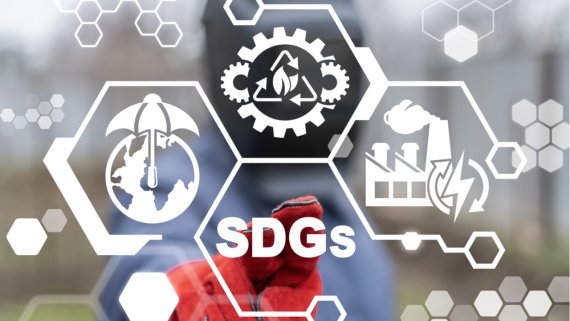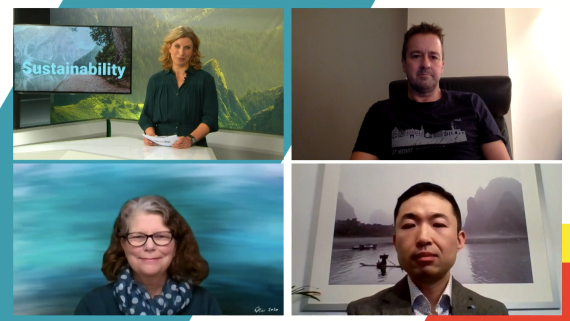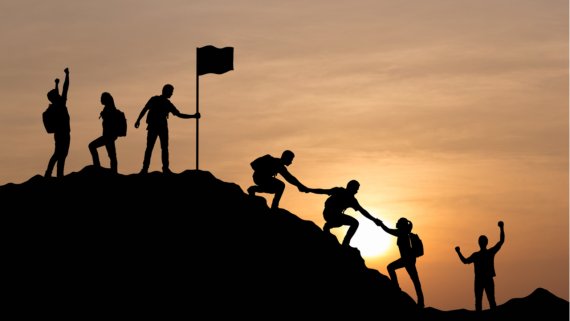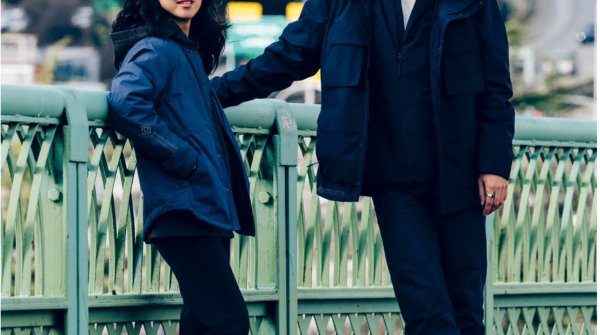
It has been five and a half years since the member states of the United Nations adopted the 2030 Agenda for Sustainable Development. The global community set itself 17 goals for a socially, economically and ecologically sustainable future: the "Sustainable Development Goals", or SDGs for short. According to the Federal Ministry for Economic Cooperation and Development, the goals "apply universally and equally to all countries. They range from the elimination of global hunger to measures for climate protection." The 17 SDGs at a glance:
- no poverty
- no hunger
- health and well-being
- quality education
- gender equality
- clean water and sanitation
- affordable and clean energy
- decent work and economic growth
- industry, innovation and infrastructure
- less inequality
- sustainable cities and communities
- sustainable consumption and production
- climate protection measures
- Life under water
- Life on land
- Peace, justice and strong institutions
- Partnerships to achieve the goals
And what does the sports industry have to do with all this? A lot! Because brands, suppliers, retailers, and athletes should also try to implement these 17 goals together and do their part to achieve them by 2030. Three experts discussed how this could be done at ISPO Munich Online:
- Jill Dumain, CEO of Bluesign,
- Richard Collier, Managing Director of Jack Wolfskin, and
- Hao Ding, Business Manager EMEA at DuPont Biomaterials and Sorona DuPont.
For Jill Dumain, sustainability has been an issue for a long time: her Swiss corporation Bluesign Technologies goes back to an initiative in 1997. Textiles bearing the Bluesign seal have been produced without hazardous chemicals. "I've been involved with the issue of sustainability for many years. My impression is: a lot is happening right now. And I'm optimistic that the sports industry can do a lot for the SDGs." Sustainability, he said, is much more than just a trend, "because we don't have a choice."

The SDGs are about hunger, education, transportation, technology, equality, and more - how do you get started? "It can be overwhelming," Dumain admits. "But the broad spectrum also has advantages because each brand can prioritize the goals in the way that best suits them. That's what they should focus on - prioritization." According to Dumain, here's how brands should go about choosing from the 17 goals set:
- "First, ask yourself what your company's values are. The more the goals you choose fit you, the more likely you are to make a difference. For example, goal number 3 appeals to us at Bluesign, while others may not be a good fit."
- "Connect the sustainability goals to your core competencies: If you build kayaks, advocate for water quality."
- "Pick a group of goals that fit well together - energy and water, for example."
- "Involve your whole company and all employees, that's really important. And only make the steps big enough that you can actually accomplish them as a company."
Everyone should definitely take the time to read through the 17 goals carefully before choosing, the Bluesign CEO advises, "Because everyone interprets them differently. I felt the same way when I first saw them. I thought, for example: Wow, yes of course we need infrastructure! But my interpretation of it was quite different from what was meant by the goal."
Preceding the Sustainable Development Goals are five core messages that tie all the goals together, which Dumain summarizes as the "5 P's:" "People, Planet, Prosperity, Partnership and Peace. These are big words and big goals. But the more people talking about them, the better."
Richard Collier, CEO at Jack Wolfskin, also advises other brands not to tackle all the goals at once, but to focus on selected ones first: "Find out which SDGs fit your brand best and pursue only those meticulously. It's impossible as a single brand to create them all - you should get away from that notion."
Collier recommends openly communicating the goals you set for yourself and not looking for perfection, especially in the beginning, "The important thing is to get started in the first place. For example, start with part of one of your products, not the whole product. In the end, something good will come out of it." Thinking smaller sometimes can also pay off, he adds: "Maybe a simple solution is just around the corner."
Collaboration, Collier notes, is key: "It's key to everything that we all pull together. We're not going to make it to the goals if everyone is working on it alone. We're all in the same boat, let's not forget that." Opportunities for brands that would otherwise be competitors to work together abound, Collier is sure: "It starts with supplier companies and ends with collaboration with each other. Don't think, for example, that sharing ideas is a bad thing. On the contrary, right now it's important to share because it benefits us all."

Hao Ding, Business Manager for Europe, the Middle East and Africa at DuPont Biomaterials, brings a different perspective to the discussion as a supplier: "You can't lose sight of the financial result in all this - there always has to be a balance between sustainability and profitability, otherwise it won't work in the long term."
The path to greater sustainability is a long journey that starts with the design process, Ding says: "We cooperate a lot with universities and scientists. In recent years, we've also collaborated with a well-known fashion school, because I'm convinced that sustainability has to be embedded in the design process and in the selection of raw materials."
Maintaining close communication with brands is important at DuPont, Ding reports. He says that close contact has shown him, "It's only in the last few years that brands have started to think about sustainability. To achieve the SDGs, we have to take one step at a time on a long journey. We are only at the beginning of this journey, but it is important that we start now. There need to be more pioneers starting now."
- ISPO awards
- Mountain sports
- Bike
- Design
- Retail
- Fitness
- Health
- ISPO Job Market
- ISPO Munich
- ISPO Shanghai
- Running
- Brands
- Sustainability
- Olympia
- OutDoor
- Promotion
- Sports Business
- ISPO Textrends
- Triathlon
- Water sports
- Winter sports
- eSports
- SportsTech
- OutDoor by ISPO
- Heroes
- Transformation
- Sport Fashion
- Urban Culture
- Challenges of a CEO
- Trade fairs
- Sports
- Find the Balance
- Product reviews
- Newsletter Exclusive Area
- Magazine






